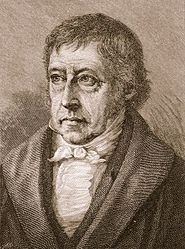Our website is made possible by displaying online advertisements to our visitors.
Please consider supporting us by disabling your ad blocker.
The Phenomenology of Spirit
 Title page of the first edition | |
| Author | Georg Wilhelm Friedrich Hegel |
|---|---|
| Original title | Phänomenologie des Geistes |
| Translator | James Black Baillie |
| Language | German |
| Subject | Philosophy |
| Published | 1807 |
| Publication place | Germany |
Published in English | 1910 |
| Media type | |
| OCLC | 929308074 |
| 193 | |
| LC Class | B2928 .E5 |
Original text | Phänomenologie des Geistes at Project Gutenberg |
| Translation | The Phenomenology of Spirit at University of Illinois Urbana-Champaign |
 |
| Hegelianism |
|---|
| Forerunners |
| Principal works |
| Schools |
| Related topics |
| Related categories |
The Phenomenology of Spirit (German: Phänomenologie des Geistes) is the most widely discussed philosophical work of Georg Wilhelm Friedrich Hegel; its German title can be translated as either The Phenomenology of Spirit or The Phenomenology of Mind. Hegel described the work, published in 1807, as an "exposition of the coming to be of knowledge".[1] This is explicated through a necessary self-origination and dissolution of "the various shapes of spirit as stations on the way through which spirit becomes pure knowledge".[1]
The book marked a significant development in German idealism after Immanuel Kant. Focusing on topics in metaphysics, epistemology, ontology, ethics, history, religion, perception, consciousness, existence, logic and political philosophy, it is where Hegel develops his concepts of dialectic (including the lord-bondsman dialectic), absolute idealism, ethical life and Aufhebung. It had a profound effect in Western philosophy, and "has been praised and blamed for the development of existentialism, communism, fascism, death of God theology and historicist nihilism".[2]
- ^ a b Hegel 2018, p. 468, Appendix.
- ^ Pinkard 1996, p. 2.
Previous Page Next Page


